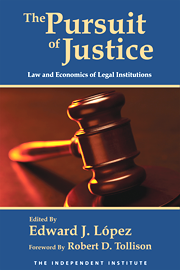In times of natural disaster, people often look to government for solutions. Sadly, it seems that politicians use disasters to further their political careers.
A prophetic article published in Economic Inquiry two years ago, by Thomas Garrett of the Federal Reserve Bank of St. Louis and Russell Sobel of West Virginia University, shows how alarmingly political disaster relief really is. Garrett and Sobel found that from 1991 to 1999 states that were more politically important to the president had a higher rate of natural-disaster declarations. Further, the average number of disasters declared in election years was 66 percent higher than the number in non-election years, yet there is little reason to believe that bad weather mimics political cycles.
They also find that states that had congressional representation on FEMA oversight committees received higher disaster expenditures. Their model estimates that for each House member on an oversight committee, the Representative’s home state receives $31 million in excess disaster expenditures. They estimate that nearly half of all disaster relief from 1991 to 1999 was devoted to furthering political goals.
Economist Alan Krueger noted recently in a New York Times article that President Bush declared 61 major disasters in election-year 2004, an increase of 10 disasters over 2003. In battleground states where the election was decided by five percentage points or less, the number of major disasters increased to 17 in 2004 from 8 in 2003—90 percent of the election-year rise.
Disaster declarations provide a unique opportunity for government officials to push pork to constituents without the usual scrutiny. While especially ill-conceived federal spending measures are often reported in the media, disaster relief spending is questioned rarely. For example, last December Ohio was declared a disaster area after getting only two feet of snow, yet few questioned the decision.
Federally funded disaster relief is not used efficiently because officials don’t face the same discipline that people face in private markets. The journey of an ice truck providing Katrina relief illustrates FEMA’s inability to coordinate and its blindness to cost effectiveness. After leaving Wisconsin and arriving in Louisiana, the truck was sent to Georgia but then rerouted to South Carolina. After ending up in Maryland, the truck’s ice sat stationary for days, while costing taxpayers money and leaving those in need of relief with fewer supplies.
FEMA’s blindness to cost has become even more apparent with the awarding of rebuilding contracts to government favorites, such as Halliburton and Bechtel, without a competitive bidding process. Those that issue the contracts cite the need for expediency, and claim that no-bid contracts went to “proven” contractors able to assist quickly in reconstruction. Unfortunately, the only thing that no-bid government contracting has “proven” is that it accomplishes wasteful spending and inflated prices.
Companies in the private sector have profits and losses to ensure that goods are being allocated efficiently; the public sector has no such information by which to make economically sound decisions. When prices rise after a disaster companies are given the information and incentive to send in more of the needed goods. FEMA instead operates on the basis of how its actions impact the political careers of those who appoint its directors and allocate its budget.
To better deal with disasters, FEMA’s role should be reduced as much as possible—ideally eliminated—and private organizations should be encouraged to take over relief duties. President Bush has recently suggested that the Pentagon should play a larger role in disaster relief, but it hardly seems fit for government to play a larger role in disaster relief when it currently performs so poorly.
The performance of the Salvation Army and Red Cross illustrate how the private sector can provide effective, pointed disaster relief in an efficient manner. Unlike FEMA, the Salvation Army is forced to be effective in its distribution of aid because the vitality of the Salvation Army comes from voluntary donations. If it doesn’t do its job well, donors will send their donations elsewhere. FEMA faces no such constraint because it gets its money through the political system. It should be no surprise that politics motivates its decisions.
FEMA is also given the responsibility of providing security. Rioting and mob-like activity hampered initial relief efforts in New Orleans, and an effective security force would have expedited relief efforts. Unfortunately, FEMA was busy stopping another movement—that of private charities into the disaster area. FEMA forced the Salvation Army and Red Cross to remain out of the New Orleans during the first days immediately following Katrina’s wrath. Perhaps security would be better handled by others, as well.
The Economist magazine called the Katrina disaster the “Shaming of America,” but they got it wrong. The outpouring of private charity has been remarkable and Americans should be proud. What has been shameful is our government’s catastrophic handling of disaster relief.








